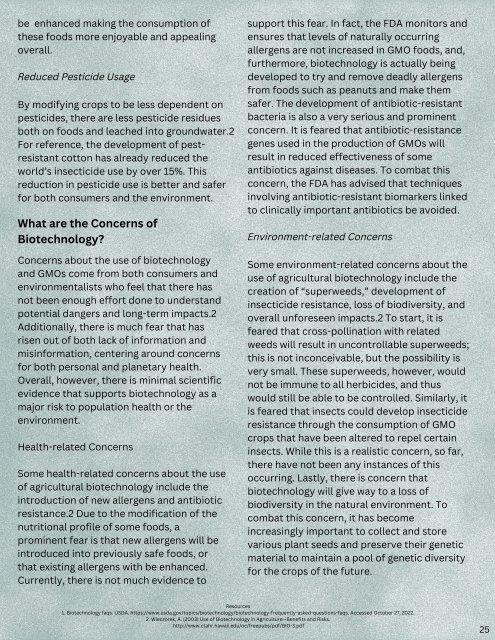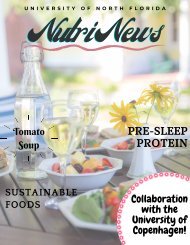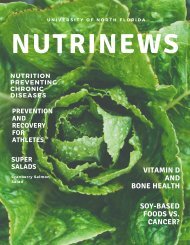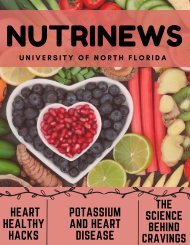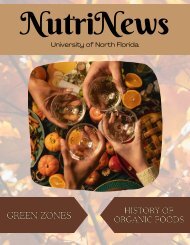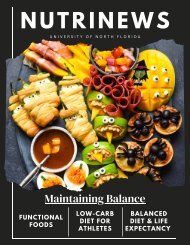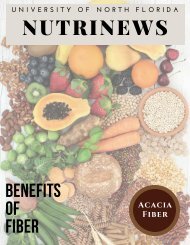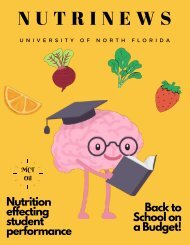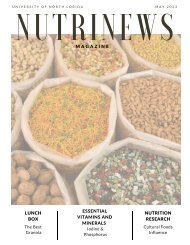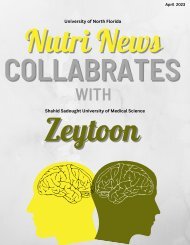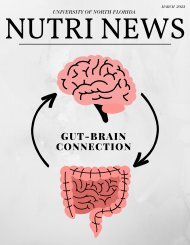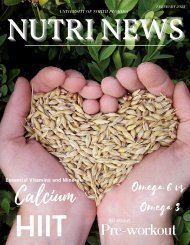Nutri News December 2022
This month theme is the colors of health!! You will find articles about: • The importance of a colorful diet “Eat the Rainbow” • How is biotechnology is affecting our foods • What is intuitive eating and how it can help you recognize and be more sensitive to your body’s hunger and satiety signals • Delicious and colorful vegan recipes in the lunch box! • What’s the hype behind Phytochemicals, are they really that important? Let me answer that for you, YESSS!! • Have you seen those foods that claim to be gluten “free” and have wonder what gluten is and if you should care whether your food is gluten free, check our myth busting article to find out more • The holidays are coming and with that all the delicious foods we like to indulge on, but beware “SALT” check out our international collaboration about salt and salt substitutes • “Ditch the dietary supplements and eat whole foods instead” What are the effects of supplement vs whole foods in sports performance • Have you been feeling tired and down recently? you might have a vitamin D deficiency, check out our essential guide to vitamins and minerals article to learn more about the role of magnesium and vitamin D in our mood, sleep, and overall health This month’s student spotlight is Lindsey Cedeno Ortiz, check what she has to say in page 12! For this month interview, we have Dr. Catherine Christie, recipient of the Academy of Nutrition and Dietetics Medallion Award. This is an interview you won’t want to miss!!!! If you are looking to make an impact on campus as well as in the community, look for the fliers highlighting volunteer opportunities. These amazing programs are always looking for more volunteers. It is amazing the difference we can make when we all work together for a better and healthier tomorrow. Happy reading!
This month theme is the colors of health!!
You will find articles about:
• The importance of a colorful diet “Eat the Rainbow”
• How is biotechnology is affecting our foods
• What is intuitive eating and how it can help you recognize and be more sensitive to your body’s hunger and satiety signals
• Delicious and colorful vegan recipes in the lunch box!
• What’s the hype behind Phytochemicals, are they really that important? Let me answer that for you, YESSS!!
• Have you seen those foods that claim to be gluten “free” and have wonder what gluten is and if you should care whether your food is gluten free, check our myth busting article to find out more
• The holidays are coming and with that all the delicious foods we like to indulge on, but beware “SALT” check out our international collaboration about salt and salt substitutes
• “Ditch the dietary supplements and eat whole foods instead” What are the effects of supplement vs whole foods in sports performance
• Have you been feeling tired and down recently? you might have a vitamin D deficiency, check out our essential guide to vitamins and minerals article to learn more about the role of magnesium and vitamin D in our mood, sleep, and overall health
This month’s student spotlight is Lindsey Cedeno Ortiz, check what she has to say in page 12!
For this month interview, we have Dr. Catherine Christie, recipient of the Academy of Nutrition and Dietetics Medallion Award. This is an interview you won’t want to miss!!!!
If you are looking to make an impact on campus as well as in the community, look for the fliers highlighting volunteer opportunities. These amazing programs are always looking for more volunteers. It is amazing the difference we can make when we all work together for a better and healthier tomorrow.
Happy reading!
You also want an ePaper? Increase the reach of your titles
YUMPU automatically turns print PDFs into web optimized ePapers that Google loves.
e enhanced making the consumption of<br />
these foods more enjoyable and appealing<br />
overall.<br />
Reduced Pesticide Usage<br />
By modifying crops to be less dependent on<br />
pesticides, there are less pesticide residues<br />
both on foods and leached into groundwater.2<br />
For reference, the development of pestresistant<br />
cotton has already reduced the<br />
world’s insecticide use by over 15%. This<br />
reduction in pesticide use is better and safer<br />
for both consumers and the environment.<br />
What are the Concerns of<br />
Biotechnology?<br />
Concerns about the use of biotechnology<br />
and GMOs come from both consumers and<br />
environmentalists who feel that there has<br />
not been enough effort done to understand<br />
potential dangers and long-term impacts.2<br />
Additionally, there is much fear that has<br />
risen out of both lack of information and<br />
misinformation, centering around concerns<br />
for both personal and planetary health.<br />
Overall, however, there is minimal scientific<br />
evidence that supports biotechnology as a<br />
major risk to population health or the<br />
environment.<br />
Health-related Concerns<br />
Some health-related concerns about the use<br />
of agricultural biotechnology include the<br />
introduction of new allergens and antibiotic<br />
resistance.2 Due to the modification of the<br />
nutritional profile of some foods, a<br />
prominent fear is that new allergens will be<br />
introduced into previously safe foods, or<br />
that existing allergens with be enhanced.<br />
Currently, there is not much evidence to<br />
support this fear. In fact, the FDA monitors and<br />
ensures that levels of naturally occurring<br />
allergens are not increased in GMO foods, and,<br />
furthermore, biotechnology is actually being<br />
developed to try and remove deadly allergens<br />
from foods such as peanuts and make them<br />
safer. The development of antibiotic-resistant<br />
bacteria is also a very serious and prominent<br />
concern. It is feared that antibiotic-resistance<br />
genes used in the production of GMOs will<br />
result in reduced effectiveness of some<br />
antibiotics against diseases. To combat this<br />
concern, the FDA has advised that techniques<br />
involving antibiotic-resistant biomarkers linked<br />
to clinically important antibiotics be avoided.<br />
Environment-related Concerns<br />
Some environment-related concerns about the<br />
use of agricultural biotechnology include the<br />
creation of “superweeds,” development of<br />
insecticide resistance, loss of biodiversity, and<br />
overall unforeseen impacts.2 To start, it is<br />
feared that cross-pollination with related<br />
weeds will result in uncontrollable superweeds;<br />
this is not inconceivable, but the possibility is<br />
very small. These superweeds, however, would<br />
not be immune to all herbicides, and thus<br />
would still be able to be controlled. Similarly, it<br />
is feared that insects could develop insecticide<br />
resistance through the consumption of GMO<br />
crops that have been altered to repel certain<br />
insects. While this is a realistic concern, so far,<br />
there have not been any instances of this<br />
occurring. Lastly, there is concern that<br />
biotechnology will give way to a loss of<br />
biodiversity in the natural environment. To<br />
combat this concern, it has become<br />
increasingly important to collect and store<br />
various plant seeds and preserve their genetic<br />
material to maintain a pool of genetic diversity<br />
for the crops of the future.<br />
Resources<br />
1. Biotechnology faqs. USDA. https://www.usda.gov/topics/biotechnology/biotechnology-frequently-asked-questions-faqs. Accessed October 27, <strong>2022</strong>.<br />
2. Wieczorek, A. (2003) Use of Biotechnology in Agriculture—Benefits and Risks.<br />
http://www.ctahr.hawaii.edu/oc/freepubs/pdf/BIO-3.pdf<br />
25


